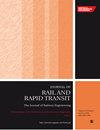基于最小熵的磁悬浮列车悬浮控制性能评价研究
IF 2.1
4区 工程技术
Q3 ENGINEERING, CIVIL
Proceedings of the Institution of Mechanical Engineers Part F-Journal of Rail and Rapid Transit
Pub Date : 2023-11-07
DOI:10.1177/09544097231213895
引用次数: 0
摘要
为了满足磁悬浮列车商业运行对可靠性和安全性的严格要求,有必要对悬挂系统进行控制性能评估。然而,目前,方差常被用作控制系统的评价指标。当系统受到非高斯干扰时,该方法无法得到准确的性能评价结果。因此,针对磁悬浮列车悬挂系统的非高斯控制性能评价,本文提出了一种基于最小熵的磁悬浮列车悬挂系统控制性能评价方法。针对磁悬浮列车悬挂系统运行数据的非高斯特性,引入了非高斯系统的反馈不变熵,实现了基于最小熵准则的磁悬浮列车悬挂系统控制性能的评价与分析。最后,结合长沙中低速磁浮列车运行数据的评估与分析,验证了所提出的性能评估方法用于磁浮列车悬挂系统控制性能评估的有效性和准确性。本文章由计算机程序翻译,如有差异,请以英文原文为准。
Study on levitation control performance assessment of maglev train based on minimum entropy
In order to meet the strict requirements of the reliability and safety of the commercial operation of the maglev train, it is necessary to carry out the control performance evaluation of the suspension system. However, at present, variance is often used as the evaluation index of control system. This method cannot get accurate performance evaluation results when the system is affected by non-Gaussian disturbance. Therefore, aiming at the non-Gaussian control performance evaluation of maglev train suspension system, a control performance evaluation method of maglev train suspension system based on minimum entropy is proposed in this paper. In view of the non-Gaussian characteristics in the operation data of maglev train suspension system, this paper introduces the feedback invariant entropy of non-Gaussian system, and then realizes the evaluation and analysis of the control performance of maglev train suspension system based on the minimum entropy criterion. Finally, combined with the evaluation and analysis of the operation data of Changsha medium and low-speed maglev train, this paper verifies the effectiveness and accuracy of the proposed performance evaluation method for the control performance evaluation of maglev train suspension system.
求助全文
通过发布文献求助,成功后即可免费获取论文全文。
去求助
来源期刊

CiteScore
4.80
自引率
10.00%
发文量
91
审稿时长
7 months
期刊介绍:
The Journal of Rail and Rapid Transit is devoted to engineering in its widest interpretation applicable to rail and rapid transit. The Journal aims to promote sharing of technical knowledge, ideas and experience between engineers and researchers working in the railway field.
 求助内容:
求助内容: 应助结果提醒方式:
应助结果提醒方式:


